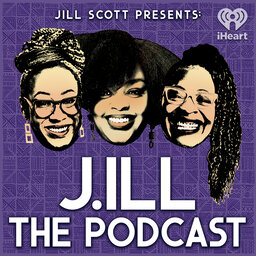Genealogy 101: Where Do I Spit?
In this week’s episode Jill, Aja, and Laiya talk to genealogist Brian Sheffey and Donya Williams. They breakdown what’s really hidden in our spit as diasporic Black people. To get a deeper understanding of your own lineage check out the links below to their books, TV show, and genealogy services.
YouTube channel: https://m.youtube.com/@GenealogyAdventures
Facebook: https://www.facebook.com/genealogyadventuresusa?mibextid=ZbWKwL
Genealogy: genealogyadventures@e360tv.com
Books:
 Jill Scott Presents: J.ill the Podcast
Jill Scott Presents: J.ill the Podcast


